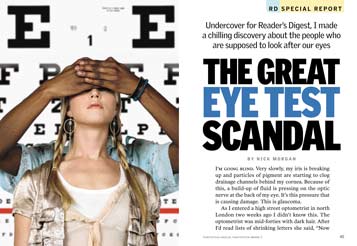 Reader's Digest, one of the UK's highest circulation magazines, has launched a blistering attack on the profession with a report entitled 'The Great Eye Test Scandal'.
Reader's Digest, one of the UK's highest circulation magazines, has launched a blistering attack on the profession with a report entitled 'The Great Eye Test Scandal'.
This latest attack comes only months after Which? (News, September 7), claimed that nearly half of all eye examinations by optometrists were poor or very poor.
Published earlier this week, the Reader's Digest report is based on reporter Nick Morgan's undercover visit to 10 optometrists for an eye test. Morgan alleges that 30 per cent of the optometrists who examined him failed to spot signs of pigment distribution and raised IOP. 'The same eyes, the same city (north London) and the same day, yet very different results,' he writes.
Register now to continue reading
Thank you for visiting Optician Online. Register now to access up to 10 news and opinion articles a month.
Register
Already have an account? Sign in here
